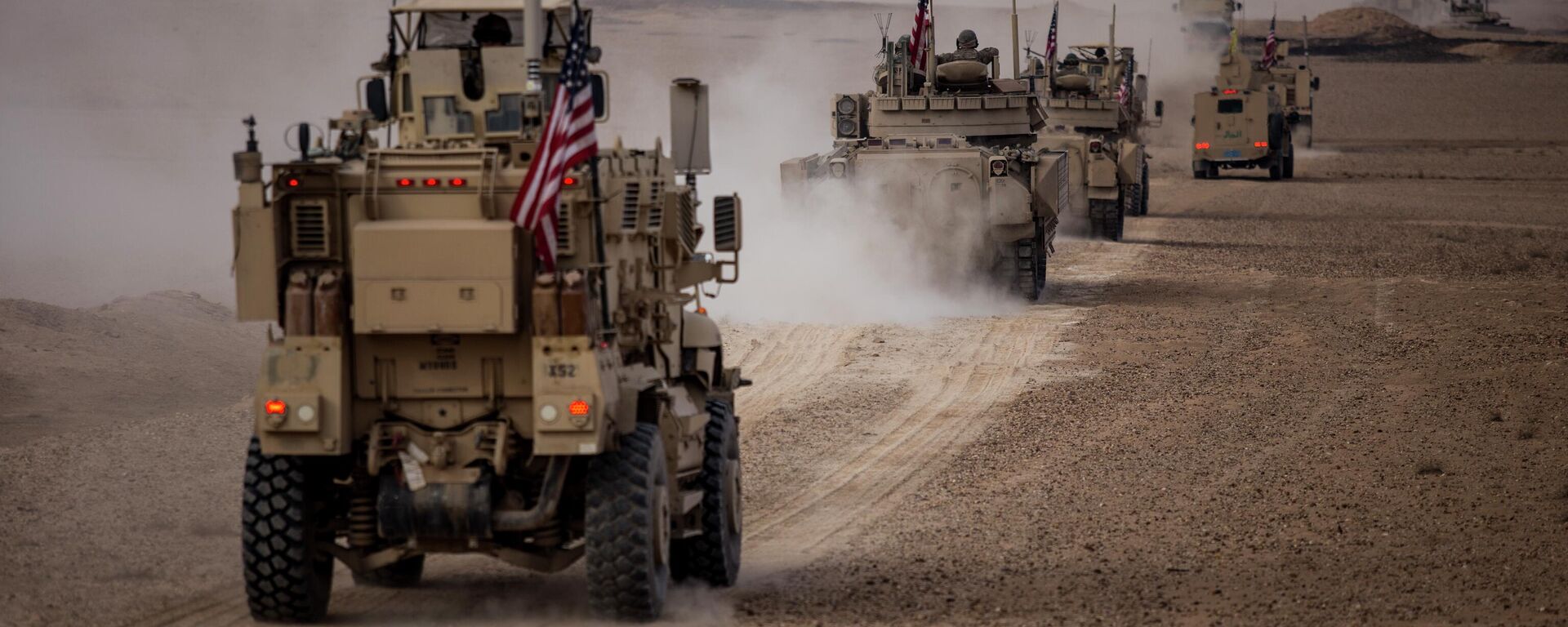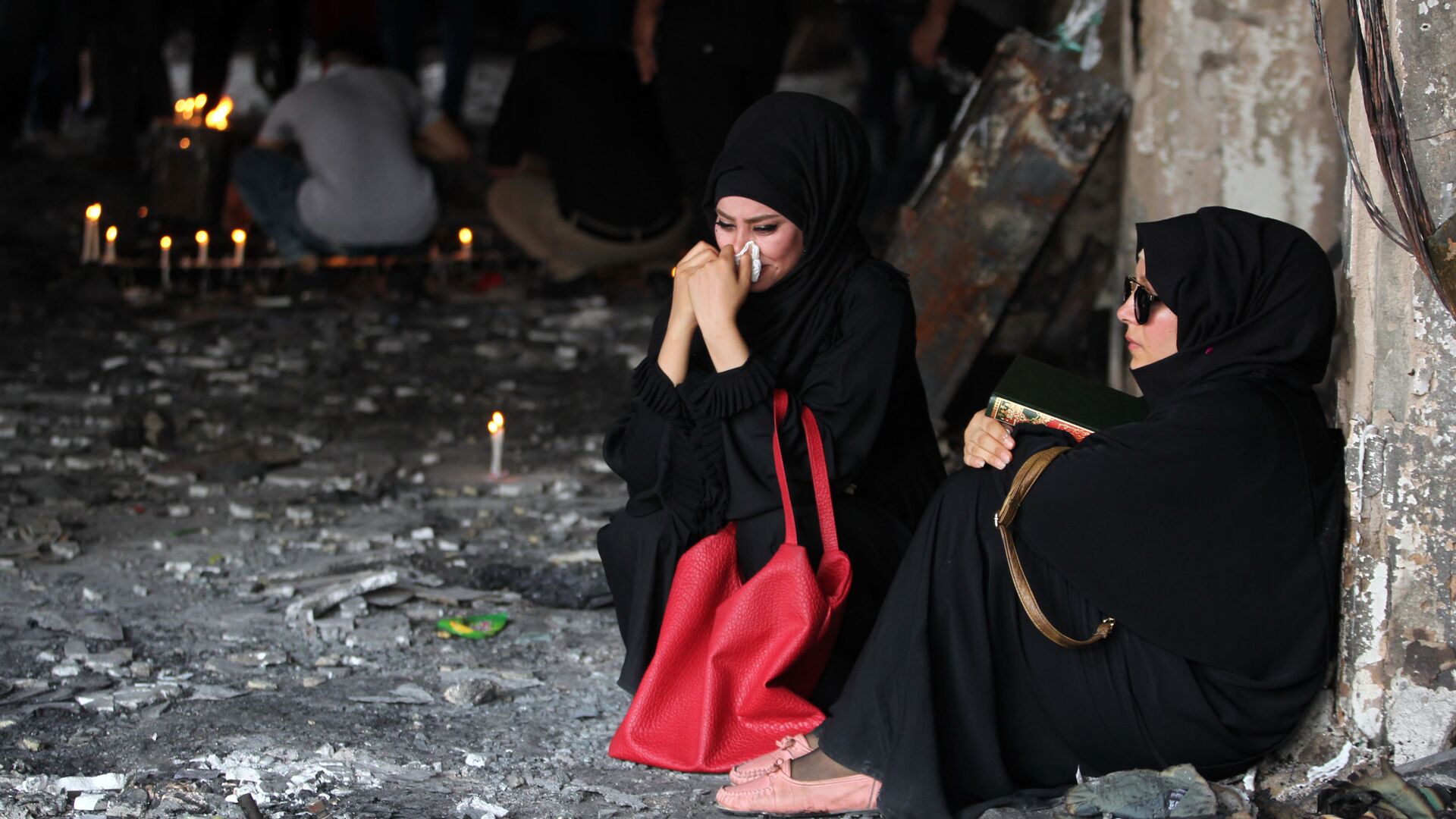https://sputnikglobe.com/20241215/kurds-urge-international-community-to-prevent-is-buildup-of-in-northeastern-syria---sdf-1121171413.html
Kurdish Forces Call for International Support Amid Rising ISIS* Threat in Syria
Kurdish Forces Call for International Support Amid Rising ISIS* Threat in Syria
Sputnik International
The Kurdish Autonomous Administration calls on the international community to provide support to the Kurdish armed groups in connection with the activation of the Islamic State in Syria, Abdelsalam Ahmad, a spokesman for the US-backed Kurdish-led Syrian Democratic Forces in northeastern Syria and Lebanon, told Sputnik.
2024-12-15T05:26+0000
2024-12-15T05:26+0000
2024-12-15T09:07+0000
world
turmoil in syria
syrian democratic forces (sdf)
bashar assad
damascus
middle east
islamic state
islamic state in iraq and the levant
isis
lebanon
https://cdn1.img.sputnikglobe.com/img/104262/49/1042624920_0:160:3072:1888_1920x0_80_0_0_76b531391ecb382d80efbd570381ac1e.jpg
"The SDF forces are part of the international coalition to fight terrorism. IS took advantage of the state of chaos and the overthrow of the regime and expanded the territories under their control," Ahmad said. "It is in the interests of the international community to support the SDF as a force that played one of the decisive roles in the fight against terrorism." The Kurdish SDF formations, supported by US forces in northeastern Syria, announced the creation of their own autonomous administration in the territories under their control in the provinces of Aleppo, Al-Hasakah, Raqqa and Deir ez-Zor after the start of the Syrian crisis in 2011. The Kurdish formations did not engage in hostilities with the government forces of Syria under the leadership of former President Bashar Assad and maintained their military potential. They are supported by the armed forces of the US-led international coalition present in northeastern Syria under the pretext of fighting the Islamic State terrorist group. This same coalition also controls key oil and gas fields in Syria. Fears Over Libyan Scenario in SyriaThe Kurdish autonomous administration fears a repeat of the Libyan scenario in Syria after the armed opposition came to power, the spokesman added.According to the SDF spokesman, Hayat Tahrir al-Sham is managing the political process in Damascus through a transitional government for a period of three months. At the same time, a number of paramilitary forces have agreed to overthrow the regime, but have not reached a common agreement on what the future political governance will be.* Terrorist organization banned in Russia andmany other countries
https://sputnikglobe.com/20241211/what-is-the-strategic-importance-of-deir-ez-zor-and-could-it-cause-new-kurdish-syrian-conflict-1121150295.html
damascus
lebanon
aleppo
syria
Sputnik International
feedback@sputniknews.com
+74956456601
MIA „Rossiya Segodnya“
2024
Sputnik International
feedback@sputniknews.com
+74956456601
MIA „Rossiya Segodnya“
News
en_EN
Sputnik International
feedback@sputniknews.com
+74956456601
MIA „Rossiya Segodnya“
Sputnik International
feedback@sputniknews.com
+74956456601
MIA „Rossiya Segodnya“
syrian turmoil, syrian collapse, syrian crisis, syria isis, syrian conflict, mideast crisis, mideast war
syrian turmoil, syrian collapse, syrian crisis, syria isis, syrian conflict, mideast crisis, mideast war
Kurdish Forces Call for International Support Amid Rising ISIS* Threat in Syria
05:26 GMT 15.12.2024 (Updated: 09:07 GMT 15.12.2024) BEIRUT (Sputnik) - The Kurdish Autonomous Administration calls on the international community to provide support to the Kurdish armed groups in connection with the activation of the Islamic State in Syria, Abdelsalam Ahmad, a spokesman for the US-backed Kurdish-led Syrian Democratic Forces in northeastern Syria and Lebanon, told Sputnik.
"The SDF forces are part of the international coalition to fight terrorism. IS took advantage of the state of chaos and the overthrow of the regime and expanded the territories under their control," Ahmad said. "It is in the interests of the international community to support the SDF as a force that played one of the decisive roles in the fight against terrorism."
The Kurdish SDF formations,
supported by US forces in northeastern Syria, announced the creation of their own autonomous administration in the territories under their control in the provinces of Aleppo, Al-Hasakah, Raqqa and Deir ez-Zor after the start of the Syrian crisis in 2011.
The Kurdish formations did not engage in hostilities with the government forces of Syria under the leadership of former President Bashar Assad and maintained their military potential. They are supported by the armed forces of the US-led international coalition present in northeastern Syria under the pretext of fighting the Islamic State terrorist group. This same coalition also controls key oil and gas fields in Syria.
Syria's armed opposition captured the Syrian capital of Damascus on December 8. Russian officials have said that Assad stepped down as president after holding negotiations with participants in the Syrian conflict and left Syria for Russia, where he was granted asylum. Mohammed al-Bashir, who ran an Idlib-based administration formed by Hayat Tahrir al-Sham and other opposition groups, was named interim prime minister on December 10.

11 December 2024, 19:11 GMT
Fears Over Libyan Scenario in Syria
The Kurdish autonomous administration fears a repeat of the Libyan scenario in Syria after the armed opposition came to power, the spokesman added.
"They [the forces that are part of the armed opposition] have disagreements on what the new system of governance in Syria should be. We will repeat the Libyan scenario," Ahmad said.
According to the SDF spokesman, Hayat Tahrir al-Sham is managing the political process in Damascus through a transitional government for a period of three months. At the same time, a number of paramilitary forces have agreed to overthrow the regime, but have not reached a common agreement on what the future political governance will be.
After the overthrow and murder of Libyan leader Muammar Gaddafi in 2011, Libya ceased to function as a unified state. In recent years, there has been a confrontation between the authorities in Tripoli in the west of the country and the authorities in the east, which were supported by the Libyan National Army under the command of Marshal Khalifa Haftar. In 2021, the Libyan Political Dialogue Forum in Geneva under UN auspices elected a transitional executive authority until the general elections, which have not yet been held.
* Terrorist organization banned in Russia andmany other countries



